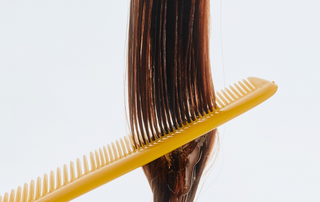Psoriasis and seborrheic dermatitis are common scalp conditions that cause itching, flaking, redness and many other unwelcome symptoms. Though uncomfortable and sometimes even painful, they can fortunately be easily treated and managed with a specially formulated medicated shampoo, such as Polytar Scalp Shampoo.
Effective medicated shampoos contain the active ingredient coal tar, which cleanses and soothes the scalp while slowing excess skin cell growth, helping to reduce scalp itching, irritation and flare-ups. However, knowing how often to use medicated shampoo is just as important for treating your symptoms. In this blog, we’ll explore how often you should use medicated shampoo for psoriasis or dermatitis to maximise scalp health, as well as how to get the most from Polytar Scalp Shampoo.
Understanding psoriasis and dermatitis
Scalp psoriasis and seborrheic dermatitis are two different conditions that affect the scalp. Both cause flaking, redness and irritation that range from mild to severe, but they have different symptoms and underlying causes.
Scalp psoriasis symptoms include:
-
Red, raised and scaly patches of skin covered with white or silver scales
-
Patches (or “plaques”) that extend beyond the hairline to the forehead, neck or behind the ears
-
Dry scalp
-
Burning sensation
-
Persistent itchiness
-
Temporary hair loss
Symptoms of seborrheic dermatitis include:
-
Greasy, yellow or white scales or flakes on the scalp
-
Red or inflamed skin beneath the flakes
-
Itchiness that may worsen with sweating or stress
-
Oily scalp or buildup, especially around the hairline and eyebrows or behind the ears
-
Inflammation
-
Temporary hair loss or thinning (although this is rare)
Symptoms between the two conditions can appear similar, but scalp psoriasis is generally more persistent and difficult to treat than seborrhoeic dermatitis. Nevertheless, medicated shampoo can help relieve symptoms of both.
What are medicated shampoos?
Medicated shampoos are specially formulated to treat scalp conditions like psoriasis and seborrhoeic dermatitis by targeting the underlying inflammation, flaking and irritation. Unlike regular anti-dandruff shampoos that only usually contain cleansing agents, medicated shampoos include active ingredients, such as coal tar, salicylic acid, ketoconazole, zinc pyrithione and corticosteroids, that help alleviate symptoms and soothe the scalp.
Polytar Scalp Shampoo is a soothing, therapeutic formula that contains a 4% coal tar solution designed to treat scalp conditions such as psoriasis and seborrheic dermatitis, along with associated symptoms like flaking, dryness and irritation. It has antiseptic, anti-inflammatory, exfoliating, keratolytic and antipruritic properties that work together to target the main causes of irritation and flakiness while also cleansing the skin to help prevent future infections.
How often should you use a medicated shampoo if you have psoriasis or dermatitis?
Knowing how often to use a medicated shampoo for scalp psoriasis or seborrheic dermatitis is essential in maintaining a healthy, comfortable scalp. In general, most medicated shampoos should be used 2–3 times per week. However, this depends on the severity of your condition and the symptoms you’re experiencing.
If you’re dealing with scalp psoriasis, how often you use medicated shampoo depends on the intensity and frequency of your flare-ups. During active periods, short-term daily use may be necessary to help control symptoms. However, once things improve, you should be able to reduce this to 2–3 times a week.
For seborrheic dermatitis, daily use of medicated shampoo may also be helpful during flare-ups, then reduced as symptoms improve. The goal is to reduce inflammation and control excess oil production without over-drying or irritating the scalp.
Factors that affect how often to use medicated shampoo for psoriasis or dermatitis include:
-
The severity of your condition. Mild cases may only need a weekly application of medicated shampoo, while more severe symptoms could require daily use to get them under control.
-
Shampoo ingredients. Gentler formulations, like shampoos containing zinc pyrithione, can be used more regularly than potent antifungals or steroids.
-
Scalp sensitivity. If you have sensitive skin, you should use a medicated shampoo less frequently and gradually increase based on how well your skin responds.
To avoid overuse or under-treatment, it's always best to consult a dermatologist, who can recommend the right frequency for your condition and scalp type.
Signs you’re using medicated shampoo too often or not enough
Finding the right balance is essential – using too much medicated shampoo can irritate your scalp, while using too little may not control your symptoms.
Here are things to look out for if you think you’re using medicated shampoo too often:
-
Increased dryness or tightness of the scalp
-
Redness
-
A burning sensation after washing
-
Flaking that gets worse or transforms into fine, powdery flakes
-
Irritated or overly sensitive skin
-
Brittle or dull-looking hair
-
Stinging or itching that gets worse after application
In comparison, here are the signs to suggest you may not be using medicated shampoo often enough:
-
Persistent or worsening flaking
-
Itchiness that doesn’t go away
-
Red or scaly patches remain active
-
Frequent flare-ups or short periods of relief
-
Oily scalp buildup returns quickly after washing
-
Minimal or no improvement after a few weeks of use
If you’re unsure whether you’re over- or underusing your shampoo, it’s a good idea to track your symptoms each time you wash your hair. That way, you can get expert advice specifically tailored to your experience with scalp psoriasis or seborrheic dermatitis.
Tips for getting the best results from your medicated shampoo
Follow these simple steps to maximise the benefits of Polytar Scalp Shampoo
1. Wet your hair thoroughly with warm water
2. Pump a generous amount of Polytar Scalp Shampoo into your hand and create a rich lather
3. Ensure the scalp and affected areas, including those beyond the hairline, are evenly covered
4. Use your fingers or a scalp scrubber to gently massage the medicated shampoo into your scalp
5. Leave Polytar Scalp Shampoo on for a total of 3-5 minutes
6. Rinse thoroughly
7. Repeat steps 1-6
8. Follow up with conditioner as required
Frequently asked questions about medicated shampoo
Can I use medicated shampoo every day?
Medicated shampoos are typically not recommended for daily, long-term use due to the risk of irritation. Most medicated shampoos – especially those containing coal tar or salicylic acid – are designed to only be used 2-3 times a week. That’s because daily use can dry out the skin and lead to further irritation. If you’re unsure how often to use a medicated shampoo, always follow the instructions on the bottle or seek advice from a dermatology expert.
Is dandruff shampoo the same as medicated shampoo?
Not always. While some standard dandruff shampoos contain active ingredients like zinc pyrithione or ketoconazole, non-medicated shampoos may not be strong enough to treat scalp psoriasis or severe cases of dermatitis.
How long does it take to see results from medicated shampoo?
You should see results within 1-2 weeks of regular use, but it can take up to 4-6 weeks before you see a difference in the condition of your scalp. If there’s no improvement or symptoms get worse during this time, consult your GP or a dermatology expert for care advice.







